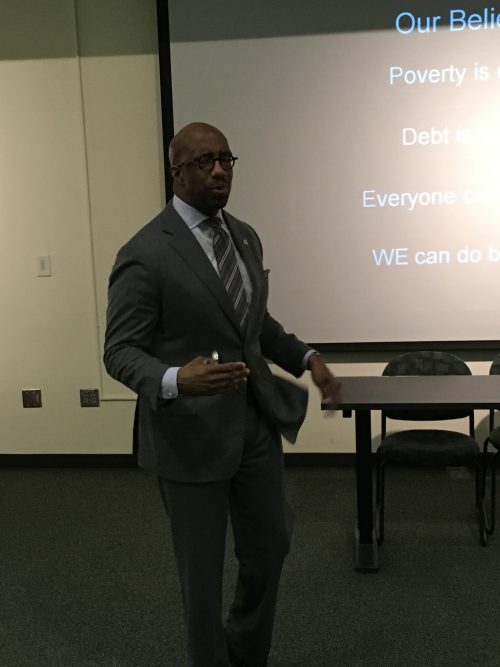This content was published: April 18, 2017. Phone numbers, email addresses, and other information may have changed.
Paul Quinn’s Michael Sorrell touts innovative educational model, HBCU experience
Photos and story by Abe Proctor
“To change something, build a new model that makes the existing model obsolete,” Michael Sorrell said during his recent presentation at Portland Community College’s Cascade Campus.
Sorrell was quoting famed American architect, designer, and iconoclast Buckminster Fuller, but the context was education. The president of Paul Quinn College in Dallas (Texas), Sorrell was on hand to speak to students from PCC, Jefferson High School, and Rosemary Anderson High School – a nearby alternative high school. He spoke about the innovative educational model he has helped put in place at Paul Quinn, as well as the benefits of attending Historically Black Colleges and Universities (HBCUs), and the importance of community engagement and service to the educational experience.
Sorrell has earned national renown through the innovative practices he has put into place at Paul Quinn, a small, private historically black liberal arts college. Under his tenure, the school has been named the nation’s first federally-recognized Work College in an urban area; implemented a student financial structure called the “New Urban College Model”; posted record budget surpluses; and transformed its football field into a working farm which helps to feed underprivileged members of the South Dallas community, as well as the Dallas Cowboys football team.
“The notion that obtaining a college degree requires amassing a mountain of debt is one of the most fundamentally absurd things I’ve ever heard,” Sorrell said.
The New Urban College Model helps students to pay for their education – and avoid crippling levels of debt – through a combination of on-campus work study, open-source textbooks and other educational materials, paid positions with local businesses, and community service. The result is an institution that is firmly connected with its community and students who are able, on average, to each graduate with less than $10,000 in debt. Moreover, they are able to draw a direct line between their studies and the workplace.
For more information about scholarship opportunities at HBCUs, contact Michelle Harper with the United Negro College Fund of Oregon at harpermichelle.m@gmail.com.

